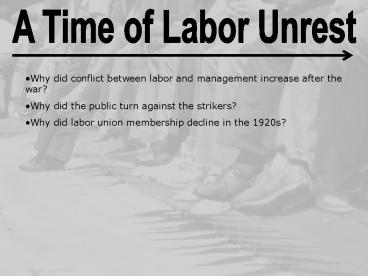A Time of Labor Unrest - PowerPoint PPT Presentation
Title:
A Time of Labor Unrest
Description:
... Calvin Coolidge, called out the National Guard There is no right to strike against public safety by anybody, anywhere, any time. After the strike ended, ... – PowerPoint PPT presentation
Number of Views:97
Avg rating:3.0/5.0
Title: A Time of Labor Unrest
1
A Time of Labor Unrest
- Why did conflict between labor and management
increase after the war? - Why did the public turn against the strikers?
- Why did labor union membership decline in the
1920s?
2
A Time of Labor Unrest
- During WWI, the US Labor Administration prevented
labor unions from striking. - In 1919, there were more than 3,000 strikes
involving approximately 4 million workers - Workers wanted better wages and working
conditions (wages had not kept pace with
inflation)
3
The "American Plan"
- the American Plan anti-labor policy advocated
by employers - it was un-American for a worker to have to join
a union to get a job (a.k.a. no closed shop
agreements) - by refusing to negotiate with unions, employers
were protecting workers rights to work (a.k.a.
no collective bargaining)
4
The "American Plan"
- actions taken by American Plan companies
- offered benefits (higher wages, stock ownership,
vacation time, etc.) - allowed formation of local company-based unions
with no outside affiliations and little power - fired striking workers and union representatives
- disseminated propaganda associating unions with
communists, socialists, and anarchists
5
The Boston Police Strike
- Boston police had not been given a raise since
the start of WWI - Representatives who asked for a raise were fired
- Remaining 1,117 officers went on strike in
September 1919 - Fear for public safety generated national
attention
6
The Boston Police Strike
- MA governor, Calvin Coolidge, called out the
National Guard - There is no right to strike against public
safety by anybody, anywhere, any time.
7
The Boston Police Strike
- After the strike ended, the striking officers
were not allowed to return to work - New officers were hired and trained
- Coolidge was praised for saving Boston, if not
the nation, from communism and anarchy
8
The Steel Mill Strike
- Steel workers wanted
- right to negotiate for shorter working hours and
higher wages - union recognition with collective bargaining
- U.S. Steel management refused to meet with
workers (September 1919) - Over 300,000 workers went on strike
9
The Steel Mill Strike
- Strikebreakers (employees who agreed to work
during the strike) were hired - Striking workers were beaten by police, federal
troops, and state militias - Management instituted a national propaganda
campaign linking the strikers to communists
10
The Steel Mill Strike
- Strike ended in January 1920
- In 1923, a report on the harsh working conditions
was made public - In response, management agreed to an 8-hour day,
though did not recognize the legitimacy of the
union
11
The Coal Miners' Strike
- United Mine Workers of America (led by John
Lewis) called for a strike on November 1, 1919 - Union wanted to protest low wages and long
workdays and workweeks - Attorney General Palmer obtained a court order
sending the miners back to work
12
The Coal Miners' Strike
- Mines stayed closed for a month beyond the court
order - President Wilson ordered an arbitrator (judge) to
settle the dispute - Workers received a 27 wage increase, but did not
get the shorter workday nor the shorter workweek
13
Labor Movement Loses Appeal
- Reasons for the decline
- unions were linked to Communists, socialists, and
anarchists - much of the work force consisted of immigrants
willing to work in poor conditions - immigrant workers were difficult to organize
because they spoke many different languages (not
English) - farmers who had migrated to the cities to find
factory jobs were used to self-reliance - most unions excluded African-Americans































